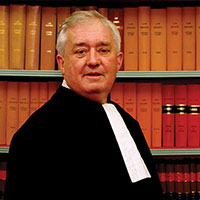A colossus of the legal world
Adam Morton takes a look back at the life of Supreme Court Judge Justice Adrian Hardiman.
 Erudite, forthright and sometimes outspoken, Justice Adrian Hardiman will be remembered as a passionate defender of constitutional rights and individual freedoms.
Erudite, forthright and sometimes outspoken, Justice Adrian Hardiman will be remembered as a passionate defender of constitutional rights and individual freedoms.
Born in Dublin in 1951, Hardiman, who prided himself as a 19th century liberal, was educated at Belvedere College, UCD and Kings Inn. At UCD his passion and skill in the debating chamber of the Literacy and Historical society, saw him tipped for a career in politics by many of his peers. Striding around campus in his suit and tie he became auditor of the debating society and was elected as head of the Student Representative Council.
He was called to the Bar in 1974 but despite this his passion for politics remained on show. Hardiman protested the 1983 abortion amendment, canvassed for Fianna Fáil’s Síle de Valera, and stood unsuccessfully for the party in the 1985 local elections in Dún Laoghaire. He was also a founding member of the Progressive Democrats and remained a member of the party until he took his Supreme Court seat.
In 1989 became a Senior Counsel and his time as a barrister saw him provide legal representation in many of the prominent legal cases of the day. Notably, he represented Pat Rabbitte and Des O’Malley during the beef tribunal, where his cross-examination of then Taoiseach, Albert Reynolds was widely praised. He also represented Democratic Left leader Proinsias De Rossa in two of his three defamation cases and Sinn Féin in 1998 when the party faced exclusion from the Northern Ireland talks.
Hardiman loved an audience. He was pugnacious, trenchant and polemical with a deep baritone. In 2000 he enjoyed the distinction of being appointed to the Supreme Court without first serving on a lower court. Only a handful of barristers have been appointed directly to the Supreme Court among them are Hardiman’s friend Hugh O’Flaherty and Niall McCarthy.
As a historian and intellectual, Hardiman had a keen sense of how the Supreme Court fitted into the story of Irish society and he became one of the most polarising and vocal figures on the court. His judicial philosophy was grounded in his concept of liberalism. He believed that certain matters were reserved in the constitution for the political branches of government and were not for judges to get involved in.
Ultimately, Hardiman’s steadfast defence of civil liberties and individual rights is what he will be remembered for. He was a champion of defendant’s rights and in a case from an individual known as JC he was in the minority as the court decided 4-3 to relax a long-standing rule that bars the State from using evidence obtained in breach of a constitutional right, regardless of whether or not it was deliberate.
In a dissent that recounted numerous documented Garda abuses and failures over recent decades, Hardiman berated the majority for giving the force “effective immunity from judicial oversight.”
Never shy in his beliefs Hardiman leaves behind wife, retired Circuit Court judge Yvonne Murphy, three sons Eoin, Hugh and Daniel and three grandchildren.





